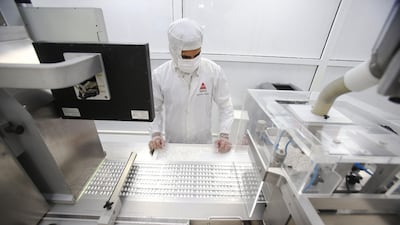Hikma Pharmaceuticals, a UK company with operations in Europe, the Middle East, North Africa and the US, has reported a 55 per cent annual drop in its 2022 profit, which it attributed to “competitive pressures” in its generics business.
Profit attributable to shareholders of the company in the 12 months ended December declined to $188 million, from $421 million in 2021, Hikma's preliminary results showed on Thursday in a filing to the London Stock Exchange, where its shares are traded.
Revenue for the year was marginally down 1 per cent to $2.517 billion, from $2.553 billion in 2021, while operating profit slid 52 per cent to $282 million from $582 million in the same period.
Earnings before interest, taxes, depreciation and amortisation shed 6 per cent to $680 million from $727 million a year earlier.
Hikma's diversified business model — which comprises injectables, branded and generics — enabled its core underlying business to deliver a “resilient performance” in 2022, executive chairman and chief executive Said Darwazah said in the filing.
Revenue and core operating profit in the company's injectables unit both rose 8 per cent, boosted by acquisitions and “good performance” in Europe.
Hikma's branded business posted 3 per cent revenue growth and a 7 per cent rise in core operating profit, driven by strong demand for medicines focused on chronic illnesses, the company said.
The generics division, meanwhile, recorded an 18 per cent yearly decline in revenue as core operating profit dropped 49 per cent, dragged by an “intense” competitive environment in the US, a limited introduction of new products and a slower-than-expected ramp-up of recently-launched products.
“Our injectables and branded businesses performed well, helping to partially offset the decline in generics,” Mr Darwazah said.
“While our generics business has been impacted by industry-wide competitive pressures, we have focused on controlling our costs, driving efficiencies and building our specialty portfolio, which will support the outlook for this business going forward.”
The pharmaceutical industry has become more challenging as companies have to deal with factors that influence their operations.
Aside from increased competition, companies have to face supply chain disruptions, labour market issues, rising inflation, pressure to innovate, sustainability goals and advances in digital technology, McKinsey & Co said in a recent study.
Pharma executives may need to take “bold changes” in the strategies to maintain resiliency and profitability, the global consultancy said.
The worldwide pharmaceutical market was estimated at $1.48 trillion in 2022, a growth of about 4.2 per cent from $1.42 trillion in 2021, data from Statista shows.
“Like many other businesses, we have also had to navigate the challenges of operating in a volatile macroeconomic environment. We experienced an increase in costs due to inflation, including higher shipping, utilities and employee benefits costs. We were also impacted by a rise in interest rates,” Hikma said.
“Through operating efficiencies, we were able to absorb these increases to a large degree, minimising their overall impact.”
executive chairman and chief executive of Hikma Pharmaceuticals
Hikma said 6 per cent of its revenue was invested in research and development supporting a “growing pipeline of complex and specialty products”.
The company also maintained a “healthy” balance sheet, and also announced a full-year dividend of 56 cents per share, up from 54 cents per share in 2021.
“Looking ahead, we are confident that we will deliver good growth across all three of our businesses in 2023 as we continue to expand our product portfolio and enhance our manufacturing and commercial footprint,” Mr Darwazah said.
Hikma has also forged partnerships to boost its profile, including licensing agreements with China's Junshi Biosciences in December and South Korea's Celltrion Healthcare in January for cancer-treatment drugs focused on the Middle East and North Africa.
In April 2022, the company completed the acquisition of California-based Custopharm in a deal valued at $425 million, as part of Hikma's plans to boost its injectables business in the US.
Hikma, founded in Jordan in 1978, supplies various generic drugs including anaesthetics, pain medications, sedatives, neuromuscular blocking agents and anti-infectives. It operates in more than 50 countries worldwide and employs about 8,700 people.


